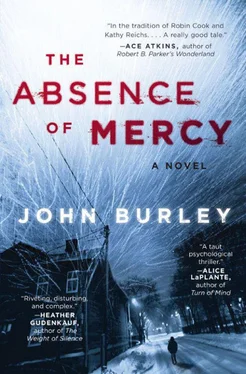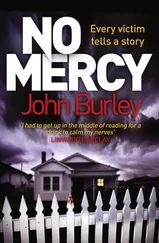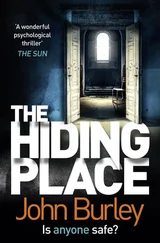“Let him be,” Susan advised him. “He’s sixteen. You remember what that was like? He’s got so many emotions churning around inside him that he can barely see straight.”
“I still don’t like the yelling. We’ve never tolerated that before. I don’t see any reason to change course now.”
“That’s true. But he’s right, Ben. What are we doing telling him he can’t go out with his friends on a Saturday night?”
“We’re trying to keep him safe, that’s what we’re doing. A young boy Thomas’s age was just murdered in our own neighborhood. I don’t think it’s unreasonable to ask him not to go out at night for a while.”
“That was eight weeks ago, and it happened in broad daylight,” Susan reminded him. “Should we be keeping him home during the day, as well?”
“It’s a parent’s responsibility to act in their child’s best interest. The first priority is keeping our boys safe.”
“But we can’t always do that,” she pointed out.
“We can try,” he told her. He stood up, filled a kettle with water, and placed it on the range to boil. “Maybe we should think about getting out of town for a while.”
“We have responsibilities—obligations, Ben.”
“A few weeks is all I’m suggesting.”
Susan shook her head. “I have a private practice to run—a full schedule of patient appointments. You have a job. The kids have school. We can’t just pick up and leave.”
“You might think differently if you’d seen the body of that boy, Susan. He’d been ravaged—his features mutilated. The person who did that to him is still out there somewhere. Do you get that?”
Susan looked at him from across the room. Her face was a mask: set, composed, and completely unreadable. Ben didn’t care. Right now all he could think about was the safety of his children.
“It won’t make any difference,” she said at last.
“What ?”
“You want them to run like cowards? Is that what you want to teach them?”
“I don’t care about teaching them anything right now,” he said. “I want them safe .”
“But you can’t make them safe, Ben.”
“I can try,” he replied. He could feel the emotions warring inside of him: anger, fear, and frustration. He almost didn’t say the words that came next. If he hadn’t—if he’d taken a moment to think before speaking—things might have turned out differently for them.
“Someone has to,” he said.
The room was very quiet for a moment.
“What is that supposed to mean?” she asked finally, her voice low but rock steady. “You think I don’t care about the well-being of our boys?”
“That’s not what I said.” He was backtracking now, a little too late.
“You think that you actually understand what love and protection are? Do you? ”
“I…”
“You have no idea about the measures I am prepared to take— that I have already taken —to safeguard the lives of those children. You have no idea, Ben.” She shook her head in exasperation. “I would do anything— anything —for them. Do you really mean to stand here and tell me that I wouldn’t?”
“I didn’t mean to imply…” He trailed off, not really knowing what he’d meant to imply.
She stood there, regarding him with a look of defiance and contempt. “I believe that we both would do whatever we could to protect our children, at whatever cost is necessary.”
Ben sat down in a chair, or rather collapsed into it. His fingers kneaded his right temple where a dull headache had begun to blossom. “And how do you plan on fighting this?” he asked.
“As a family,” she replied. “We have to take care of each other. Just as we always have.” She studied him from across the table for a moment. “They’re safer here with us than they would be anywhere else without us.”
“Are you sure?” he asked.
“I’m certain.”
She took his hand in her own and held it. “You know I love you.”
“Yes, I know th—” he began, but she held up her hand, indicating for him to be quiet.
“You know I love you,” she said again. “And I would never break up this family.” Her eyes continued to watch him, and Ben knew enough this time to be silent. “I will fight for them. I will do whatever it takes to protect them. And I would fight for you. Do you know that?”
“Yes.”
“Good.” She glanced down at their hands, folded together on the kitchen table, then looked up at him again. “And Benjamin?”
“Yes?”
“Don’t you ever think or imply otherwise. I won’t tolerate that form of betrayal from you.”
She watched him for a moment to make certain he understood, then slid her hands away from him, stood up, and left the room.
That night Ben went to bed early, feeling broken and exhausted from his arguments first with his son, and subsequently with his wife. His interactions with Joel at the dinner table hadn’t been particularly stellar, either, now that he thought about it. Susan had told him that they didn’t take sides, that they were a family. That was all well and good if you weren’t the one on the outside looking in, if you weren’t the odd man out. But that was exactly how he had felt lately, with all of them. The problem was, none of them had seen that boy’s body that night. None of them had tried in vain to sew up the boy’s face so it didn’t look like someone had taken a huge bite out of it—which, in fact, they had. His wife and children had the luxury of thinking about that violence in an abstract way. He did not.
Despite his best efforts to keep the lines of communication with his family open, things had been strained between them over these past two months. How could they not be? To make matters worse, Ben hadn’t been sleeping well, and he felt perpetually fatigued and irritable. Last Wednesday, he caught himself dozing off at work right in the middle of reviewing a pathology slide of a needle biopsy from a breast mass. He was looking at the specimen under the microscope and started to hear the sound of snoring. When he glanced up, he realized that he was the only one in the room and that the snoring had been his own. The slide had fallen off the microscope’s stage and onto the counter, cracking the cover slip. What in the hell was I doing catching a few winks in the middle of a cytology exam? he’d flogged himself . Sorry about your invasive Stage IV breast cancer, ma’am. It probably could’ve been properly diagnosed and treated five years earlier if I hadn’t been taking an afternoon siesta while examining your biopsy . That had been completely unacceptable.
The thing of it was, he kept going over the kid’s autopsy in his mind: driving to work; walking up and down the aisles of the local supermarket; having dinner with his family; and certainly lying awake at night, staring for alternating periods at the ceiling and the bedroom clock. He kept picturing the postmortem examination—his mind running over the details repeatedly in the same way that his gloved fingertips had traced a line from puncture wound to puncture wound that day. It seemed to him that there was something he’d seen but not quite noticed, some detail he had overlooked. The consequence was that the small frame of a young boy now lay still and muted beneath the ground without, at the very least, the justice his death demanded.
Ben turned onto his left side and stared at the empty space in the bed next to him. It was still early, but Susan would be coming to bed soon. They didn’t play that one-of-us-sleeps-on-the-couch-after-an-argument game. She would come to bed and, when she did, he would apologize for being such a jerk. Tomorrow morning he would apologize to Thomas, as well. Susan was right. He couldn’t lock his boys away in a vault for the rest of their lives just because he was afraid for their safety. Thomas was a sophomore in high school. By next spring he’d be driving, and in a year and a half they’d be poring over undergraduate catalogs together, planning visits to college campuses, and filling out admission forms. Ben only had a short period of time left with his oldest son before Thomas headed out into the broader world for good. Now was the time to be bolstering his son’s confidence and encouraging his independence, not stomping all over it. Things could be better again, he reminded himself. We just have to stick together as a family, that’s all .
Читать дальше
Конец ознакомительного отрывка
Купить книгу












